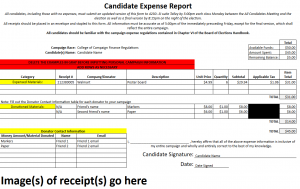Read the Election Handbook here.
Campaign Finances
All candidates are required to submit three (3) expense reports during the campaign period as outlined by the Board of Elections each semester. The dates of required expense reports shall be posted on the Board of Elections website no later than the All Candidates Meeting.
What is an expense report?

An expense report details a candidate’s spending for their race from the time of formation of their campaign up to 5:00 PM the Friday before the expense report is due. The final expense report shall be due 15 minutes after polls close and shall be comprehensive of all spending for a campaign from the time of formation.
In the event that the leading candidate in a race does not submit their final expense report by the required time, they have from the time of notification (via email) until the beginning of the next Senate meeting to submit a final expense report. If they do not adhere to this requirement, their seat will be forfeited and awarded to the runner-up of their race.
Please note that any time or service(s) donated by someone who normally charges for their time or services should be counted as a donation. Additionally, all material donations should be considered as donations. The amount of donations counts towards a candidate’s spending limit.
Receipts for purchased materials should be submitted with expense reports, at the bottom of the report as shown in the image above. Expense reports without receipts will be considered incomplete and the candidate for whom they were submitted shall be issued an automatic warning.
All candidates are REQUIRED to submit an expense report REGARDLESS of whether any money was spent on their campaign.
How to submit an expense report
Expense reports should be submitted as a PDF by email to sgelections@ncsu.edu.
Spending limits
- Student Body President and Vice President (joint ticket): $400
- Student Senate President: $260
- Student Body Treasurer: $260
- Senator: $50
- Other elective offices: $210
- Department-level elective offices: $70
If a candidate exceeds the spending limit for their race, they shall be subject to a direct disqualification hearing.
In the event of a runoff election, candidates will have a new spending limit of up to 25% of the limit for their general election race.
Expense report disclosure
All submitted expense reports are considered public records and are available upon request. Expense reports for the Spring 2021 election can be found here.
Violations
A violation occurs when a candidate running for a Student Government office does or says something that disobeys the rules laid out by the Board of Elections handbook for that election cycle.
Violation Submissions
In the event you witnessed a candidate breaking a rule stated in the Handbook or one a part of University policy, please submit the information to sgelections@ncsu.edu in the following format within 72 hours of the event:
Subject Line: VIOLATION-Date
Your Student ID Number
Your Telephone Number
Violation Process
Once a violation is submitted, the Board of Elections Chair will contact all involved parties and schedule a violation hearing. If a party is unable to attend, someone else may attend on their behalf. If a party brings another representative with them to the hearing, only one person will be permitted to speak — the other will not be allowed to speak unless directly addressed by the Board. In the violation hearing, all involved parties will have the opportunity to state their case and ask questions to other involved parties. After questions have been asked by the board and all parties, the Board will deliberate in private and finally vote on the issue using a simple majority. Results will be reported to the candidate(s) within 24 hours of the decision, and subsequently posted to a running list (currently found here).
Please be mindful of hearing decorum, found here.
Violation Results
There are currently four types of decisions that the Board may come to:
- Dismissal: A dismissal is issued when the Board determines that no violation occurred.
- Notification: A notification is issued when the Board determines that a minor violation occurred, including when a candidate has broken a rule but did not gain a significant advantage. There is no limit for the number of notifications a candidate may receive; however, a pattern of abuse may lead to additional action.
- Warning: A warning is issued for significant violations. A candidate may receive a maximum of three (3) warnings. Upon issuing the third warning, the Board shall schedule a disqualification hearing with the candidate. If the candidate is not disqualified in the aforementioned hearing, any subsequent warnings will result in automatic disqualification for the candidate.*
- Direct Disqualification: Candidates may be directly disqualified (without receiving three warnings) for severe disregard of campaign regulations or malicious tampering with election equipment. If a violation hearing results in a direct disqualification, a disqualification hearing shall be scheduled. This hearing will determine if the candidate is disqualified or not.*
As decisions are made during an election cycle, the results will be posted here.
For more information about violations, see Section VII of the Elections Handbook.
*Please note that disqualified candidates are not eligible to be appointed to any elected Student Government office.
Violation Appeals
If a candidate believes the Board acted without all relevant information in a violation hearing, they can petition for a re-hearing of the decision made by the Board. The petitioner must include any and all additional information that will be presented. The re-hearing will be conducted under the same rules as a violation hearing. See Section VII (A) of the Elections Handbook for more details about violation appeals.
University Policies, Regulations, and Rules (PRRs)
While the Board of Elections does not have the authority to determine if a candidate has broken a PRR, all candidates are expected to be compliant with all PRRs. A complete list of all PRRs can be found here.